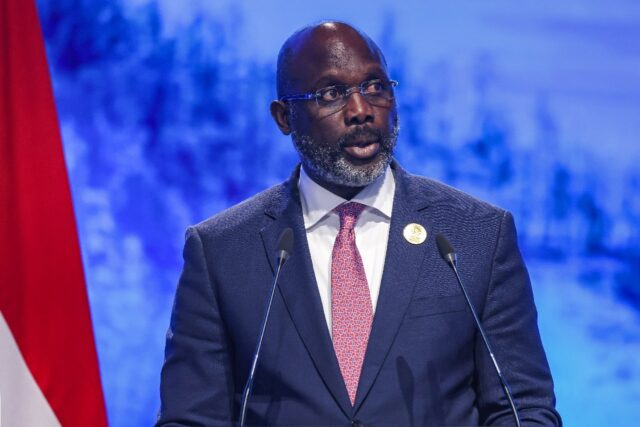Cecelia Johnson has voted in five Liberian presidential elections and lived through two brutal civil wars, but the 65-year-old small trader says the past few years have been some of the toughest, economically, in memory.
When she goes to the polls for Liberia’s presidential and parliamentary elections on October 10, Johnson, like many Liberians interviewed by AFP, will be voting for improved living conditions and better infrastructure.
Many are also worried about possible electoral violence in the West African nation, which suffered back-to-back civil wars between 1989 and 2003 that left more than 250,000 people dead.
The parading of a coffin bearing a candidate’s photograph through the streets during a campaign event on Saturday did little to soothe those concerns.
Twenty presidential candidates are competing to lead the country of about five million, including the incumbent George Weah, a former international football star.
Campaigning kicked off this month, and many Liberians say the rising cost of living and concerns over corruption are key issues that will affect their vote.
Some 1.3 million people — more than a fifth of the population — live on less than $2.15 per day, according to the World Bank.
Graft is endemic in Liberia, and fighting it was one of Weah’s major campaign promises in the last election, but last year the United States accused three of his close allies of corruption and imposed sanctions on them.
In April, Washington’s outgoing ambassador accused lawmakers of “buttering their own bread” and “feathering their own nests” while underfunding hospitals and service centres, leaving rural citizens “destitute”.
The watchdog Transparency International ranked Liberia 142nd of 180 countries in its 2022 corruption perceptions index.
“We want to see good facilities in our country, and we need more jobs,” Johnson, the trader, told AFP from the market where she sells plastic dishes, as the pouring rain washed away campaign flyers in the streets.
“Whoever wins the presidency after the election, our prayer is that they see reason to help the lives of the poor and improve the road conditions in the (rural) areas.”
Abraham Kollie, a commercial motorcycle driver and student, said job creation should be the next president’s priority.
Sixty-three percent of Liberians are under the age of 25, according to UN figures.
“Most of us, the young people, after leaving high school and college, turn to commercial motorcycle riding because there are no jobs”, Kollie told AFP.
“When elections are coming, they promise us all these (things) and they don’t (do) it.”
Fragile peace
Voters are also worried about electoral violence.
Alexander Commanbine, 42, said politicians often manipulate young people into instigating violence during election periods.
“There’s a need for the young people to really be engaged,” he said.
“People should establish peace groups from the community level and talk to the youths about peace.”
Next week, Liberia will commemorate the 20th anniversary of the Accra Peace Agreement, which ended 14 years of fighting.
Civil society groups and rights advocates have called on candidates to focus their campaigns on real issues, and not sow division.
“They must be able to explain their parties’ manifestos to the electorate and state exactly what they intend to do… to avoid violence and intimidation,” said Augustine Tamba of the Liberia Elections Observation Network, an umbrella group of civil society organisations.
Twenty-six political parties signed a peace pledge in April.
But on Saturday, some supporters of the ruling Coalition For Democratic Change (CDC) were seen carrying a casket bearing the photograph of former vice president Joseph Boakai, a frontrunner in this year’s presidential race.
Lawrence Yealue, who runs the civil society group Accountability Lab Liberia, expressed concern about the incident so early into the campaign.
“If care is not taken… these campaigns could be marked by… pockets of violence across the country, and that violence could cause a potential threat to our already fragile peace,” he said.

COMMENTS
Please let us know if you're having issues with commenting.